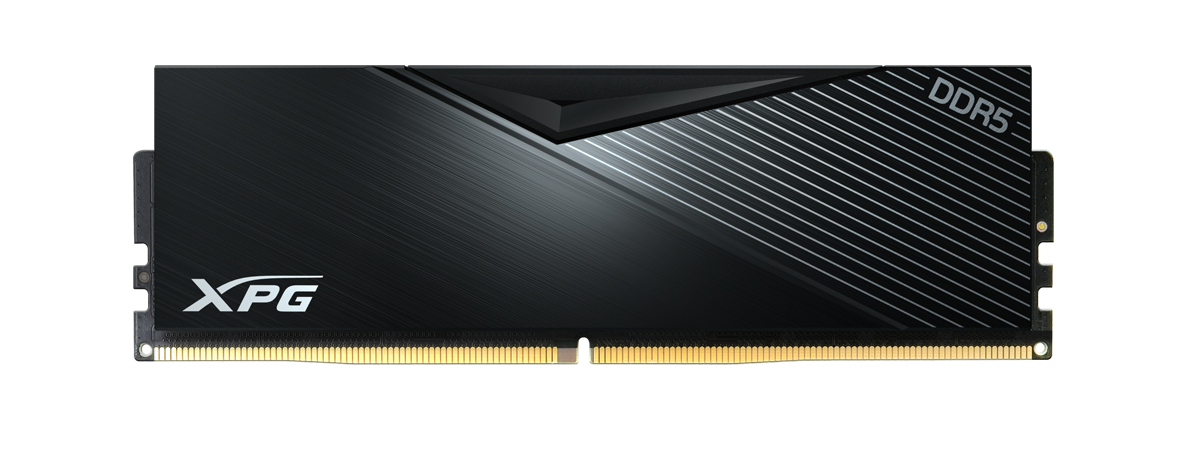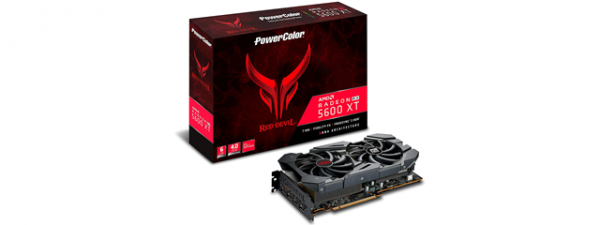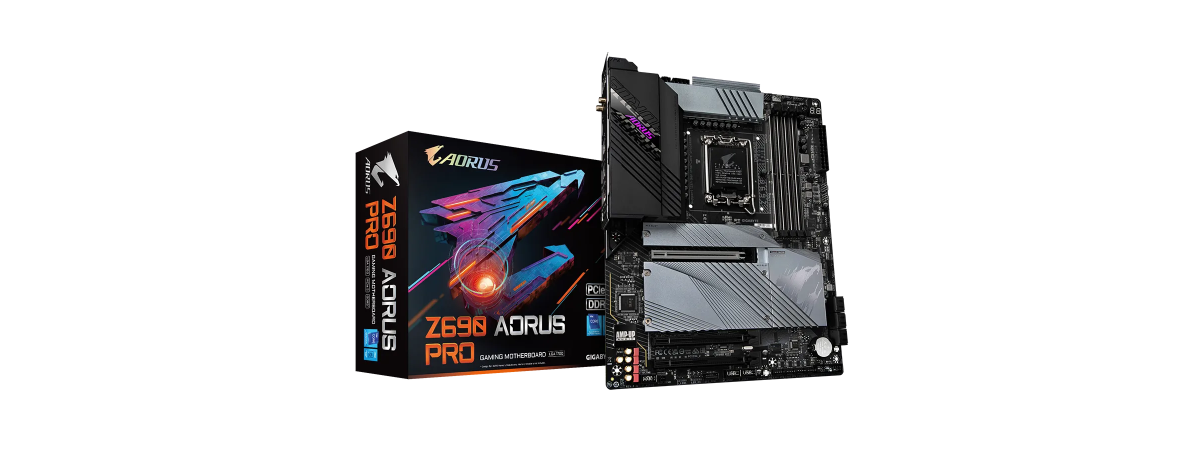
Gigabyte Z690 AORUS Pro - Benchmark results
We tested the Gigabyte Z690 AORUS Pro motherboard using these hardware and software components:
- Processor: Intel Core i7-12700K
- Cooler: ASUS ROG Ryujin II 360
- Memory: Kingston FURY Beast DDR5 RAM (2 x 16GB, 4800MHz)
- Graphics Card: ASUS TUF Gaming GeForce RTX 3090
- Storage: Kingston KC3000 SSD (2TB, PCI-Express 4.0)
- Monitor: ASUS ROG Strix XG32VQ Curved Gaming Monitor (2560 x 1440 resolution, at 144Hz)
- Power Supply Unit: ASUS ROG Thor 850W Platinum
- Operating System: Windows 11 Pro Version 21H2 Build 22000.348
To get a better idea on how good it is, we also compared it with an ASUS ROG Maximus Z690 Extreme motherboard that costs three times more. 🙂 Can Gigabyte’s Z690 AORUS Pro match it?
We began the benchmarks with CPU-Z. In its Single Thread test, the Intel Core i7-12700K got 791 points on the Gigabyte Z690 AORUS Pro motherboard and 792 on ASUS ROG Maximus Z690 Extreme, so practically the same score.
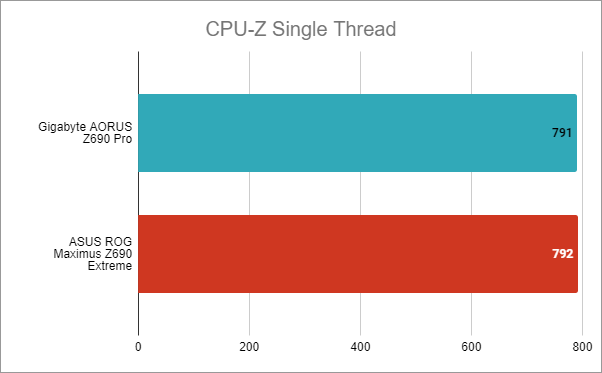
Gigabyte Z690 AORUS Pro: Benchmark results in CPU-Z Single Thread
In the Multi-Thread test from CPU-Z, which aims to evaluate the multi-core performance, we got 9300 points with the Gigabyte Z690 AORUS Pro and 9299 points on the Gigabyte Z690 AORUS Pro. Again, these are practically identical results.
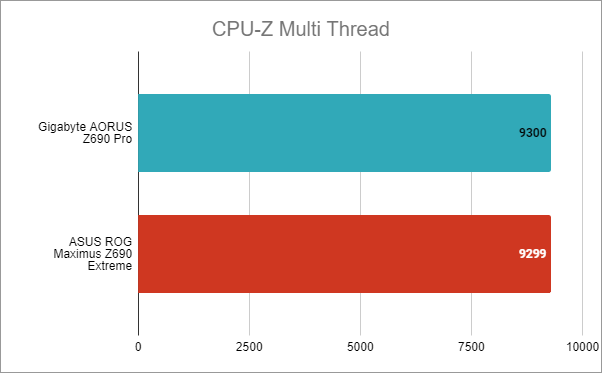
Gigabyte Z690 AORUS Pro: Benchmark results in CPU-Z Multi Thread
In Cinebench R23, which is an excellent benchmark if you want to know how fast your computer is at rendering jobs, we got a score of 22032 points with Gigabyte Z690 AORUS Pro, which is only slightly less than with the ASUS ROG Maximus Z690 Extreme, with which we got 22128 points.
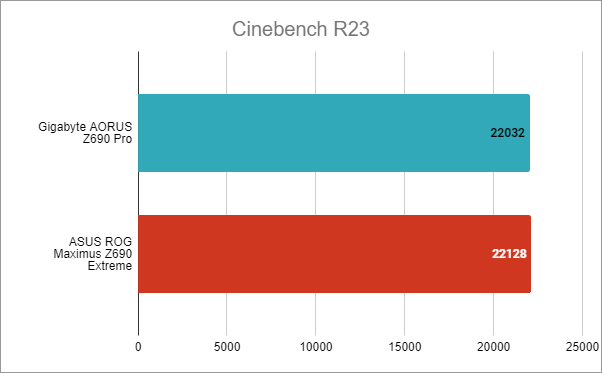
Gigabyte Z690 AORUS Pro: Benchmark results in Cinebench R23
In Blender, another rendering benchmark, we chose to use two scenes: bmw27 and classroom. Here, the shorter the time needed to render, the faster the computer. With the Gigabyte Z690 AORUS Pro the jobs were done in 6.8 minutes, and with the ASUS ROG Maximus Z690 Extreme, in 6.9 minutes. As it appears, Gigabyte’s motherboard is a bit faster, but still, we would say they’re identical, as the results are inside the margin of error for this type of benchmark.
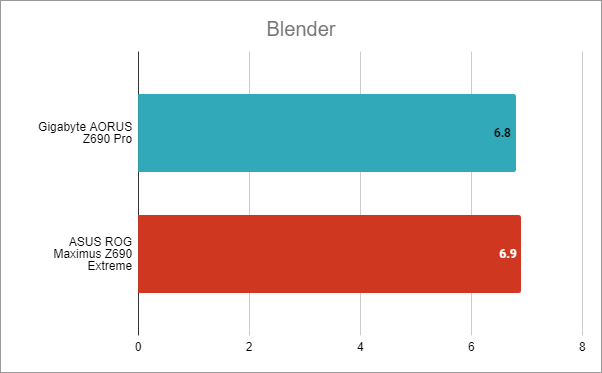
Gigabyte Z690 AORUS Pro: Benchmark results in Blender
Next, we moved on to a benchmark that assesses the performance of computers in real-life situations: PCMark 10. By real-life situations, we mean daily activities like browsing the internet, video conferencing, app start-up times, productivity, and digital content creation. Using the Gigabyte Z690 AORUS Pro motherboard, we got 8528 points, while using the ASUS ROG Maximus Z690 Extreme we got 8517 points. Again, these results show that the two motherboards offer practically the same performance.
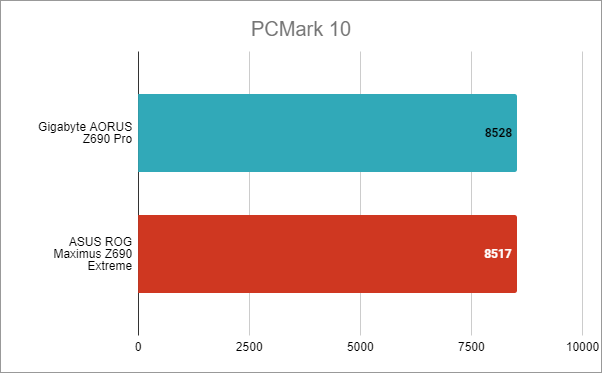
Gigabyte Z690 AORUS Pro: Benchmark results in PCMark 10
To get into a bit more detail about the web browsing experience, we also ran the JetStream 2 benchmark in Google Chrome. Here, we got a surprising result, as the Gigabyte Z690 AORUS Pro managed a slightly better score than the premium ASUS ROG Maximus Z690 Extreme. It was faster by about 6%!
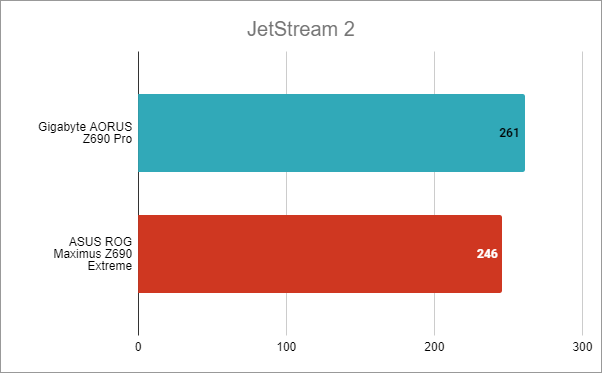
Gigabyte Z690 AORUS Pro: Benchmark results in JetStream 2
As the Gigabyte AORUS Z690 Pro is a motherboard targeted at gamers, we had to also run some gaming benchmarks. We started with Shadow of the Tomb Raider, in which both motherboards rendered more than 200 frames per second (1080p resolution, lowest graphics quality). Still, the Gigabyte mainboard managed a slightly higher fps.
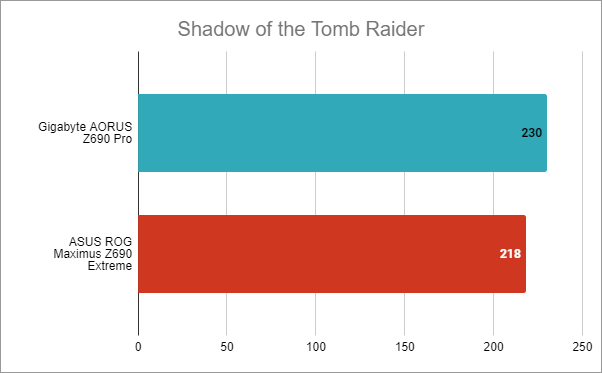
Gigabyte Z690 AORUS Pro: Benchmark results in Shadow of the Tomb Raider
In Metro Exodus, a game that’s very demanding in terms of hardware resources, using the lowest visuals possible, the fps was above 200 with both motherboards. And, just like in Shadow of the Tomb Raider, Gigabyte’s mainboard managed a few frames more!
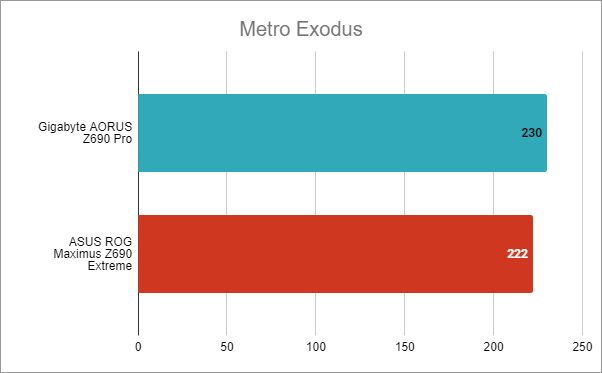
Gigabyte Z690 AORUS Pro: Benchmark results in Metro Exodus
In Assassin’s Creed Valhalla, also using the lowest visuals quality and in 1080 resolution, on both motherboards, we got a similar number of frames per second(168 with the AORUS Pro and 166 with the Maximus Extreme).
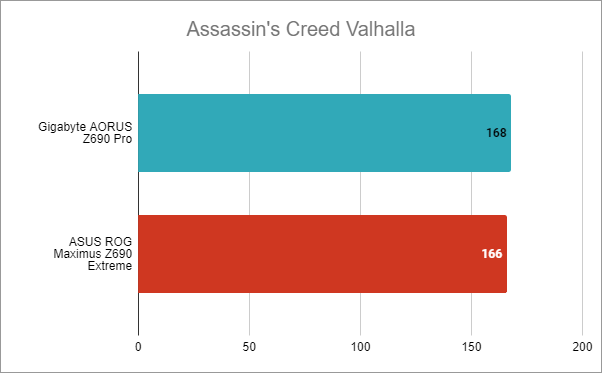
Gigabyte Z690 AORUS Pro: Benchmark results in Assassin's Creed Valhalla
Even if the benchmarks for motherboards are not that illustrative for their performance, as the results are greatly impacted by the likes of the processor, RAM, SSD, or graphics card you use, they’re still useful to get an idea of what to expect. And, as we’ve seen, the Gigabyte Z690 AORUS Pro is an amazing mid-range motherboard that can easily compete even with premium Z690 motherboards.
Software bundled with the Gigabyte Z690 AORUS Pro
Gigabyte doesn’t force you to install any of its software. However, immediately after you install Windows, you’re asked whether you want to download and install its APP Center. It’s a program that looks rather classic, but which you may want to get, as it lets you access some useful tools. The APP Center behaves much like a central hub from which you can update the drivers for your motherboard, quickly access some Windows settings, and install Gigabyte’s tools and some third-party software.
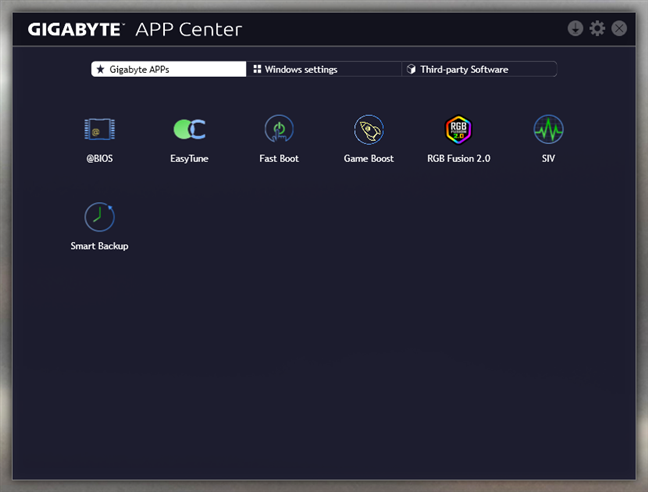
Gigabyte APP Center
The tools you can install and access from Gigabyte’s APP Center are as follows:
- @BIOS: an app that allows you to update the motherboard’s UEFI BIOS, either using the firmware you already got from Gigabyte’s support website or by downloading it directly from the company’s servers.
- EasyTune: lets you adjust various features and settings for the motherboard, like the fans speed, processor and memory overclocking, power options, and hotkeys.
- Fast Boot: allows you to decrease the boot time of your computer.
- Game Boost: helps you optimize manually selected games or apps by closing other processes and freeing up memory.
- RGB Fusion 2.0: controls the lighting effects of the LED strips and other devices connected to the motherboard.
- SIV: or System Information Viewer lets you see details about your system, and monitor hardware components such as the processor and memory, as well as create alerts for when temperatures reach specified levels.
- Smart Backup: allows you to create backups of your files or partitions and easily recover them when you have to.
- Norton Internet Security: a security solution that includes an antivirus and a firewall, for which you get a trial version for 90 days.
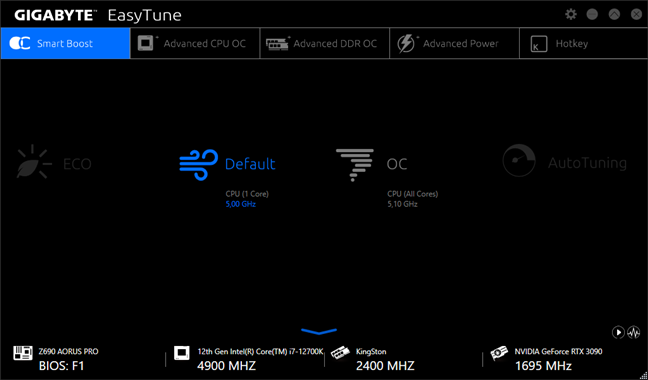
Gigabyte EasyTune
We appreciate the fact that Gigabyte doesn’t preinstall apps or other software that you may or may not want. The Gigabyte APP Center is useful, although its looks are rather spartan and old-school, and some of the tools it offers can come in handy if you want to customize the way your PC works.
What’s your opinion about the Gigabyte Z690 AORUS Pro?
The Gigabyte Z690 AORUS Pro proved to be a really good motherboard, one that we like and recommend to anyone looking to build a gaming PC with an Intel Alder Lake processor. Before closing the page, use the comments section below to let us know what you think of the Gigabyte Z690 AORUS Pro. Do you intend to buy this motherboard, or do you have other options in mind?


 06.12.2021
06.12.2021 
